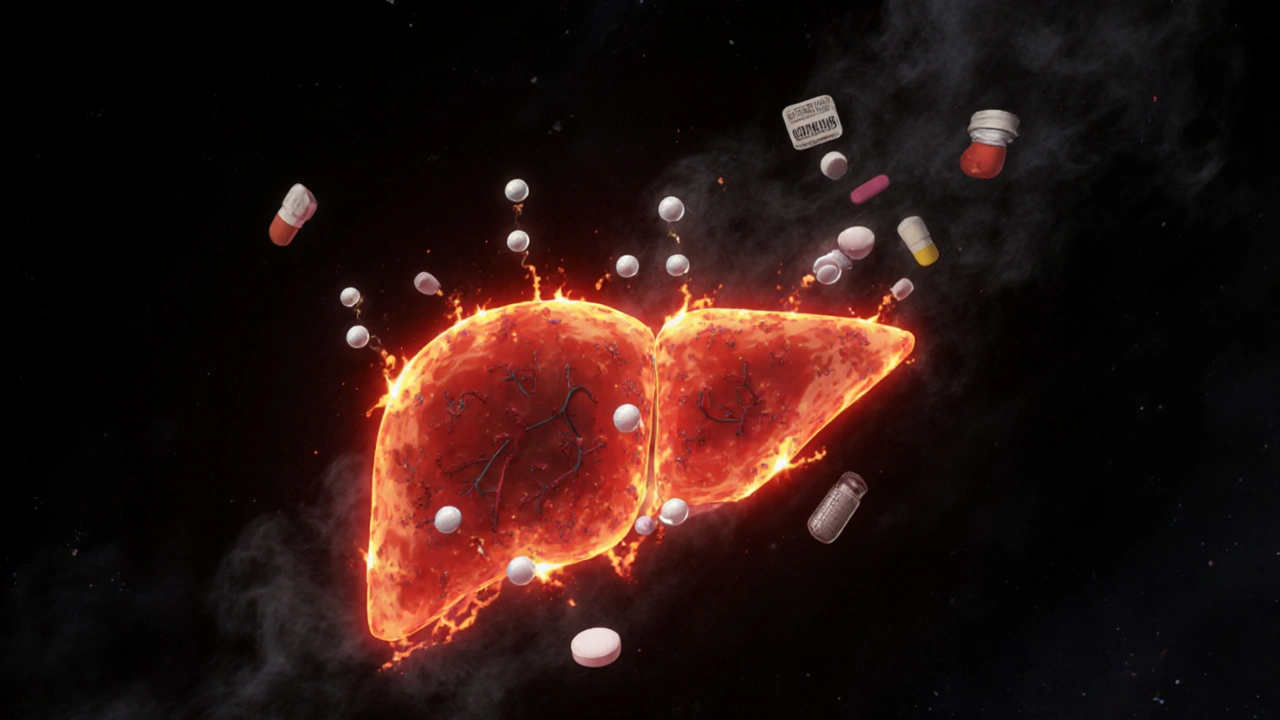Carbamazepine Interaction Calculator
Medication Interaction Calculator
Calculate how carbamazepine may affect your other medications. Based on your inputs, this tool shows potential reduction in effectiveness and safety recommendations.
Results
Enter your carbamazepine dose and medication to see interaction details.
Carbamazepine isn't just another seizure medication. If you're taking it - or considering it - you need to understand one hard truth: carbamazepine doesn't just affect your brain. It changes how your entire body processes other drugs. This isn't theoretical. It's happening right now in thousands of patients, often without anyone realizing it until something goes wrong.
How Carbamazepine Rewires Your Liver
Carbamazepine works by turning up the volume on your liver's drug-processing system. It doesn't block enzymes - it forces them to multiply. Specifically, it activates two nuclear receptors, PXR and CAR, which tell your liver to produce more CYP3A4 and CYP2B6 enzymes. These enzymes are responsible for breaking down about half of all prescription medications. When carbamazepine wakes them up, they start working overtime.
This isn't subtle. Studies show carbamazepine can reduce the blood levels of other drugs by 60% to 80%. That means if you're taking a medication that normally works at 10 mg, carbamazepine might make it behave like you're only taking 2-4 mg. The result? The drug stops working. That's why people on birth control pills get pregnant. Why warfarin stops preventing clots. Why antidepressants lose their effect.
The Hidden Trap: Carbamazepine Changes Itself
Here's the twist: carbamazepine doesn't just affect other drugs - it changes how it works in your body, too. This is called autoinduction. Within just 3 to 4 weeks of starting carbamazepine, your liver starts breaking it down faster. Your blood levels can drop by 30% to 50%. That’s not a fluke - it’s built into the drug’s design.
Doctors often start patients on 200 mg twice a day. But after a month, that same dose might not be enough. Patients report breakthrough seizures or mood crashes, not because their condition got worse - but because their body learned to clear the drug too fast. That’s why therapeutic drug monitoring is non-negotiable. Blood levels need to be checked at 2 weeks and again at 4 weeks after starting or changing the dose. Without it, you're flying blind.
Which Drugs Are Most at Risk?
Carbamazepine doesn't pick and choose. It targets any drug that relies on CYP3A4, CYP2B6, CYP2C9, or CYP2C19 for breakdown. Here are the most dangerous combinations:
- Oral contraceptives: Ethinyl estradiol levels can drop by 50-70%. Unplanned pregnancies are common and often blamed on user error - when the real culprit is carbamazepine.
- Warfarin: Carbamazepine speeds up warfarin breakdown. INR drops. Clots form. Doses often need to be increased by 50-100% - and even then, monitoring is critical.
- Statins: Simvastatin and lovastatin can become ineffective or dangerously toxic. Atorvastatin is safer, but still needs monitoring.
- Antidepressants: SSRIs like sertraline and SNRIs like venlafaxine lose potency. Tricyclics like amitriptyline can build up to toxic levels after carbamazepine is stopped.
- Immunosuppressants: Cyclosporine and tacrolimus levels crash. Organ transplant patients have rejected grafts because of this interaction.
- Benzodiazepines: Alprazolam and midazolam lose effectiveness while on carbamazepine - but if you stop carbamazepine suddenly, those same drugs can overdose you.
A 2017 study of over 2,400 people on carbamazepine found that nearly 4 out of 10 needed a dose change because of another drug they started or stopped. The biggest troublemakers? Anticoagulants, antidepressants, and transplant meds.

Carbamazepine vs. Other Inducers: Why It’s Unique
There are other strong enzyme inducers - rifampin, phenytoin, St. John’s wort. But carbamazepine stands out.
Rifampin induces CYP3A4 faster and stronger - but it’s a short-term drug, usually used for infections. Carbamazepine is taken for years. That makes its long-term interaction profile far more dangerous. Phenytoin also induces enzymes, but it hits CYP2C9 harder. Carbamazepine is more selective for CYP3A4, which is the most common metabolic pathway in the body.
And unlike rifampin, which needs just 5 days to reach full effect, carbamazepine takes 14 days. That delay is dangerous. A doctor might start a patient on a new drug, assume it’s working, and never check levels - only to find out two weeks later that carbamazepine kicked in and wiped out the effect.
What Happens When You Stop Carbamazepine?
Stopping carbamazepine isn't like turning off a switch. Your liver doesn’t instantly shut down the extra enzymes it built up. Those enzymes stick around for weeks. That means drugs that were being cleared too fast now start building up to toxic levels.
There are real cases of people ending up in the ER after stopping carbamazepine - not because they overdosed on carbamazepine, but because their alprazolam, clonazepam, or even some antidepressants suddenly became too strong. One patient in a 2021 case report had severe sedation and respiratory depression after stopping carbamazepine while still taking daily alprazolam. The dose hadn’t changed - but the liver’s enzyme activity had dropped.
That’s why when you stop carbamazepine, you must also lower the doses of other medications metabolized by CYP3A4 or CYP2B6 - slowly, over 2 to 4 weeks. No shortcuts. No assumptions.

What’s New? Better Options on the Horizon
Carbamazepine has been around since the 1960s. Newer drugs are being developed to avoid these problems. Eslicarbazepine, a cousin of carbamazepine, was approved in the U.S. in 2013 and shows 80% less enzyme induction. It’s now a go-to alternative for many neurologists who want seizure control without the drug interaction chaos.
In 2023, the FDA approved a new extended-release version of carbamazepine - carbamazepine-ASP - designed to maintain steadier blood levels and reduce the intensity of enzyme induction. Early data suggests it lowers interaction risk by about 30%.
And now, researchers are looking at genetics. Some people have natural variations in their PXR and CAR receptors that make them more or less sensitive to carbamazepine’s effects. A clinical trial (NCT05678901) is currently testing whether genetic testing can predict who will have severe interactions - and who won’t. This could one day let doctors pick the right drug for the right person.
What You Need to Do Right Now
If you’re on carbamazepine:
- Make sure your doctor knows every medication you take - including over-the-counter drugs, supplements, and herbal products.
- Ask for blood level checks at 2 weeks and 4 weeks after starting or changing your dose.
- Never stop carbamazepine without medical supervision - and never assume your other meds are still working at the same dose.
- If you’re on birth control, use a backup method like condoms or an IUD. Don’t rely on pills alone.
- Keep a written list of all your meds and share it with every provider you see - even dentists.
If you’re a prescriber:
- Always check for carbamazepine interactions before adding any new drug.
- Use resources like Lexicomp or Micromedex - they flag carbamazepine as a strong inducer.
- Don’t wait for problems to happen. Proactively adjust doses of sensitive drugs like warfarin, statins, and immunosuppressants.
- Consider switching to eslicarbazepine or another non-inducing agent if the patient is on multiple meds.
Carbamazepine is still a vital tool - especially for certain types of epilepsy and trigeminal neuralgia. But it’s a scalpel, not a hammer. Use it carefully. The consequences of ignoring its interactions aren’t just side effects - they’re hospitalizations, organ rejection, unplanned pregnancies, and sometimes death.
Can carbamazepine make birth control pills fail?
Yes. Carbamazepine reduces ethinyl estradiol levels by 50-70%, which can lead to unintended pregnancy. Birth control pills are not reliable when taken with carbamazepine. Use a non-hormonal method like an IUD or condoms. Even progesterone-only pills may be affected. Don’t rely on pills alone.
How long does it take for carbamazepine to start affecting other drugs?
It takes about 14 days for carbamazepine to fully induce liver enzymes. That’s why interactions often appear after the first month of use. Don’t assume a new drug is working just because it worked at first - carbamazepine may have kicked in later and reduced its effectiveness.
Do I need blood tests if I’m on carbamazepine?
Yes. Therapeutic drug monitoring is essential. Check blood levels at baseline, then at 2 weeks and 4 weeks after starting or changing the dose. This catches autoinduction early. Without testing, you won’t know if your dose is too low or too high - and you won’t know if another drug is interacting with carbamazepine.
What happens if I stop carbamazepine suddenly?
Stopping carbamazepine suddenly can cause seizures to return, but it can also make other drugs suddenly too strong. Enzymes induced by carbamazepine stick around for weeks. Drugs like alprazolam, clonazepam, or antidepressants can build up to toxic levels. Always taper carbamazepine slowly and reduce doses of interacting drugs over 2-4 weeks.
Are there safer alternatives to carbamazepine?
Yes. Eslicarbazepine is a close relative that provides similar seizure control with 80% less enzyme induction. Lacosamide, levetiracetam, and lamotrigine are also non-inducing options. Ask your doctor if switching is possible - especially if you’re on multiple medications or have a history of drug interactions.
Can I take St. John’s wort with carbamazepine?
No. St. John’s wort is also a strong CYP3A4 inducer. Taking it with carbamazepine can lead to dangerously low levels of both drugs - and increase the risk of seizures or mood episodes. Avoid all herbal supplements unless approved by your prescriber.
Why do some people have worse interactions than others?
Genetics play a big role. Variations in the PXR and CAR receptors affect how strongly someone responds to carbamazepine. Some people naturally induce enzymes more than others. Clinical trials are now testing genetic tests to predict who will have severe interactions - but that’s not standard yet. Until then, assume everyone is at risk.






Patrick Dwyer
29 October 2025 - 22:03 PM
Carbamazepine’s CYP3A4 induction is one of the most underappreciated pharmacokinetic phenomena in clinical neurology. The autoinduction kinetics are particularly insidious-patients often present with breakthrough seizures not because of disease progression, but because hepatic enzyme upregulation has halved their steady-state concentrations. Therapeutic drug monitoring isn’t optional; it’s the only objective metric we have to counteract this metabolic drift. I’ve seen patients on 1200 mg/day who were functionally subtherapeutic at week 3 because their labs weren’t checked until week 6. The window for intervention is narrow.
And don’t get me started on the warfarin interactions. INR can plummet from therapeutic to subtherapeutic in under 10 days post-initiation. Many providers assume the anticoagulant is stable, but carbamazepine’s induction is delayed, insidious, and lethal if missed. I always cross-check all new prescriptions against CYP3A4 substrates before signing off.
Glenda Walsh
31 October 2025 - 19:01 PM
Wait-so if you’re on carbamazepine, and you take birth control, and you get pregnant-IT’S NOT YOUR FAULT??
Like, seriously??
Doctors just don’t tell you this??
That’s insane!!
And what about people who’ve been on it for years??
How do you even know??
Why isn’t this on the pill bottle??
Someone should sue!!
Raj Modi
1 November 2025 - 15:12 PM
It is indeed a remarkable pharmacological phenomenon that carbamazepine, through its activation of the pregnane X receptor (PXR) and constitutive androstane receptor (CAR), triggers a cascade of cytochrome P450 enzyme upregulation, particularly CYP3A4 and CYP2B6, which are responsible for the metabolism of approximately 50% of all clinically utilized pharmaceuticals. The autoinduction phenomenon, wherein the drug enhances its own metabolism, leads to a progressive decline in plasma concentration over a period of 14 to 28 days, necessitating careful titration and serial therapeutic drug monitoring. This is especially critical in patients receiving concomitant medications such as oral contraceptives, anticoagulants, or immunosuppressants, where subtherapeutic concentrations may result in catastrophic clinical outcomes including unintended pregnancy, thromboembolic events, or graft rejection. The advent of eslicarbazepine, which demonstrates significantly reduced enzyme-inducing potential, represents a paradigm shift in the management of epilepsy and neuropathic pain, particularly in polypharmacy scenarios. Furthermore, emerging pharmacogenomic research into polymorphisms within the PXR gene may soon enable personalized dosing algorithms that mitigate these interactions at a genetic level.
Cecil Mays
3 November 2025 - 02:01 AM
THIS IS SO IMPORTANT!!! 😱
I had a friend on carbamazepine who got pregnant while on the pill-she thought she was being careful!! 😞
Doctors need to TELL people this. Like, RIGHT AWAY. Not just in fine print. 🚨
Also-eslicarbazepine? That’s a game-changer!! 🙌
Why isn’t this in every med school lecture??
Sharing this with my whole family now. 💪
Sarah Schmidt
3 November 2025 - 23:49 PM
There’s a deeper truth here, one that transcends pharmacology: we live in an age where medicine treats symptoms as if they exist in isolation, when in fact the body is a web of interconnected systems, and every molecule we introduce is a stone dropped into a pond. Carbamazepine doesn’t just alter enzyme activity-it reveals the arrogance of our reductionist paradigm. We prescribe without considering the cascading effects, the silent, systemic revisions our bodies make to accommodate foreign agents. The real tragedy isn’t the failed birth control or the clotted artery-it’s that we’ve normalized this. We’ve made patients responsible for remembering every interaction, every warning, every footnote in a 200-page drug guide. And we call it ‘informed consent’ while the system remains blind.
It’s not carbamazepine that’s dangerous. It’s the illusion that medicine can be controlled, predictable, and safe-when biology, in its infinite complexity, refuses to be tamed.
Billy Gambino
4 November 2025 - 05:42 AM
Let’s be real: carbamazepine’s enzyme induction is the pharmaceutical equivalent of a backdoor exploit. It’s not a side effect-it’s a feature. The drug was designed to autoinduce. The manufacturers knew. The FDA knew. But we’re told it’s ‘normal pharmacokinetics.’
Meanwhile, patients are left scrambling when their antidepressants stop working, their INR crashes, their transplant meds vanish. And the response? ‘Oh, we didn’t realize you were on birth control.’
This isn’t negligence. It’s systemic. The drug interaction database is a graveyard of unacknowledged deaths. And now they’re pushing ‘carbamazepine-ASP’ like it’s a fix? It’s a Band-Aid on a hemorrhage.
Genetic testing? Sure. But until we stop treating patients as data points and start treating them as living systems, this will keep happening.
Karen Werling
4 November 2025 - 22:09 PM
I’m a nurse and I’ve seen this play out so many times…
One patient, 42, on carbamazepine for trigeminal neuralgia, started on sertraline for anxiety. Three weeks later, she was in the ER with serotonin syndrome-because when they stopped carbamazepine, the sertraline levels spiked. Nobody told her the enzymes stick around.
I keep a printed carbamazepine interaction list taped to my desk. I hand it to every patient. I make them read it out loud.
And yes-use an IUD. Seriously. 💙
STEVEN SHELLEY
6 November 2025 - 10:51 AM
THIS IS ALL A LIE!!
THE PHARMA COMPANIES MADE CARBAMAZEPINE TO CONTROL PEOPLE!!
THEY WANT YOU TO NEED MORE DRUGS BECAUSE THEY KNOW IT BREAKS DOWN OTHERS!!
THEY EVEN MADE THE NEW VERSION TO TRICK YOU INTO THINKING IT’S SAFE!!
THE FDA IS CORRUPT!!
YOUR DOCTOR IS IN ON IT!!
AND THEY’RE USING YOUR DNA TO TRACK YOU!!
THEY’RE TESTING ON YOU IN THE CLINICAL TRIALS!!
STOP TAKING IT!! GO NATURAL!!
Emil Tompkins
7 November 2025 - 20:59 PM
So you're telling me this whole thing about carbamazepine is just… real?
Like, no conspiracy? No hidden agenda?
It's just… a drug that makes other drugs stop working?
And doctors don't even know?
And people get pregnant?
And transplants fail?
And no one's suing?
Wow.
I feel like I just woke up from a dream.